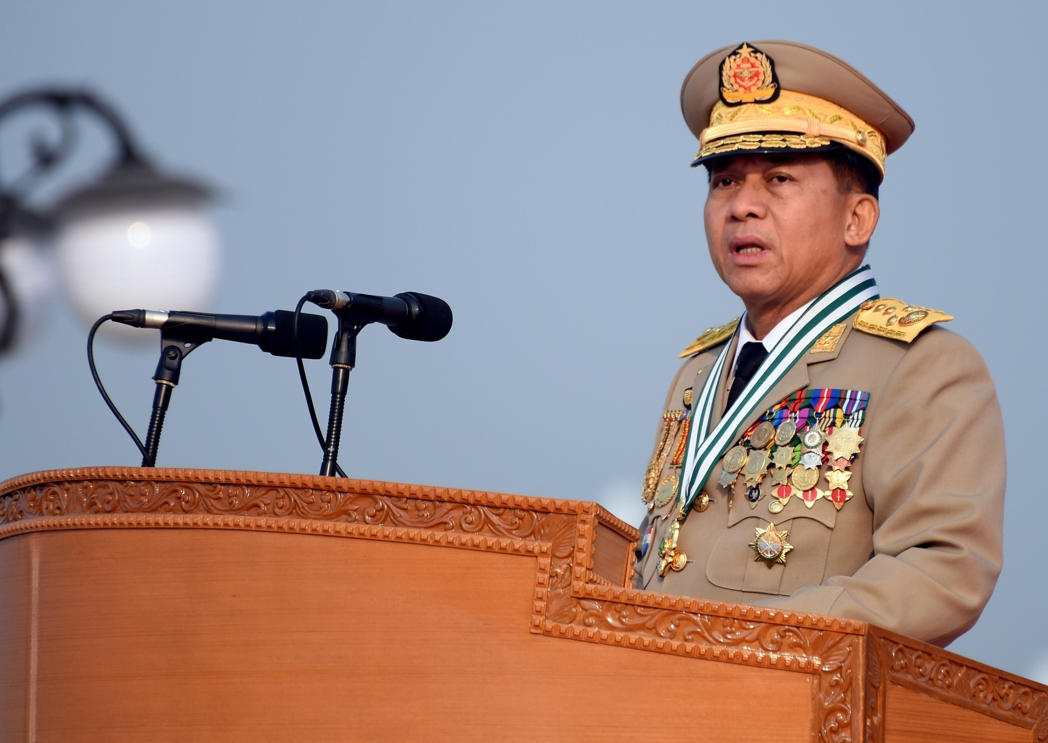Myanmarese military leader Min Aung Hlaing and a senior Russia security official have committed to improving ties between the two nations. The Myanmarese senior general is in Moscow to participate in a three-day international conference on security which begins today.
The secretary of Russia's Security Council, Nikolai Patrushev discussed the fight against terrorism, regional security issues and bilateral relations with the junta leader on Monday. The Myanmarese general will meet other senior leaders in Moscow but a meeting with Russian President Vladimir Putin has been ruled out.
The Moscow Conference for International Security is being organised by the Russian Defence Ministry and will have senior security leaders from across the world.
According to media reports, the general is attending the conference at "the invitation of the Russian Defence Minister". Myanmar and Russia enjoy close ties and the latter has been supporting the military regime before the UN. Myanmar also has approved the Russian Sputnik V vaccine for emergency use.
Read More: India may need to bond with ASEAN, Japan and South Korea to address the situation in Myanmar
The visit takes place immediately after the UN General Assembly UNGA) adopted a resolution which condemned the military's use of 'lethal force and violence'. The UNGA has also called upon the world to prevent the flow of arms into conflict-torn Myanmar. The resolution was approved by 119 countries while 36 abstained Including Russia, India and China. Only Belarus voted against the resolution.
Russia has been coming to Myanmar's aid often at the international fora over human rights violations. In March Russia defended Myanmar before the UN saying that sanctions being imposed by the Western nations could further fuel the conflict in the country.
Russian arms sales to Myanmar are the cement in their relationship with Russia next only to China in arms sales to the South-East Asian country.
Russia sells jets, tanks and helicopters to the Myanmar military. Indian think tank Observer Research Foundation (ORF) says: "Barely a week ahead of the emergency declaration, Russian Defence Minister Sergei Shoigu was in Myanmar for an official visit. During this period, deals were signed for supply of the Pantsir-S1 surface-to-air missile system, surveillance drones, and radar equipment. This sale of drones is the first time Russia has entered the ‘drone export space'."
Both–the Myanmarese general and the Russian Defence Minister–have been frequent visitors to each other's countries–strengthening a rather new relationship.
In his 2020 visit to Moscow, the Myanmarese general had revealed before the media that there were powers in Myanmar which were supporting terrorists in the country. The general's statement was thought to be an indirect reference to Beijing arming and training ethnic rebels in his country–revealing mistrust against China. However, with Russia not sharing a border with Myanmar, the latter is comfortable dealing with Moscow.
The visit to Russia comes as a bit of a surprise as the conditions in Myanmar are far from satisfactory. The general had himself admitted in an interview earlier this month that he was surprised by the unrelenting reaction of the people to the coup.
This is General Aung Hlaing's second foreign visit after the February 1 coup. He had earlier visited Indonesia in April to meet the leaders of the Association of Southeast Asian Nations (ASEAN). The regional grouping has been holding discussions with the military over restoration of democracy and has come out with a five-point consensus–also hailed by India.
The takeover by the Myanmar military unsettled the fledgling democracy in the country led by popular leader Aung San Suu Kyi. She along with other members of her party have been detained for a year and charges pressed against her.
It is estimated that approximately 872 people have been killed in clashes between the junta and pro-democracy supporters.




















